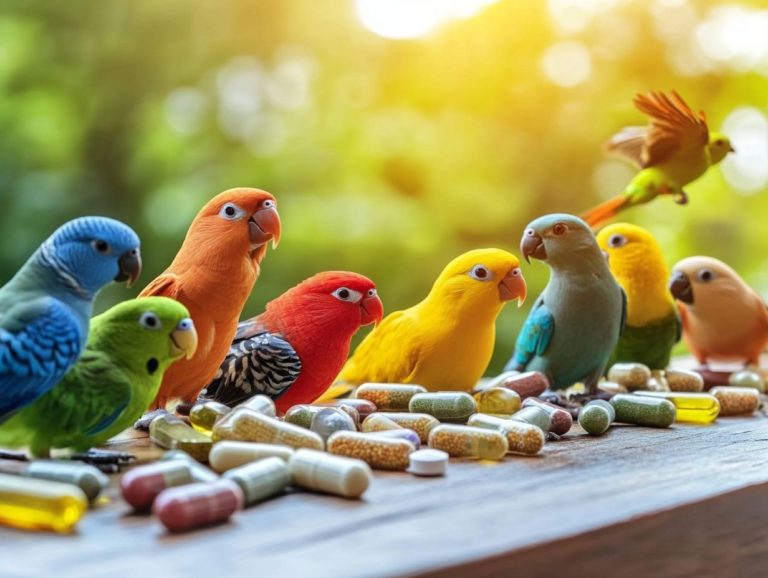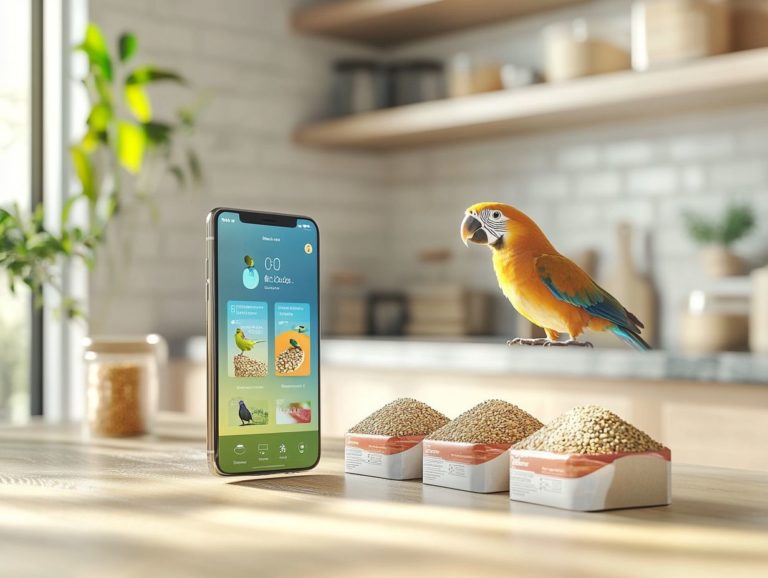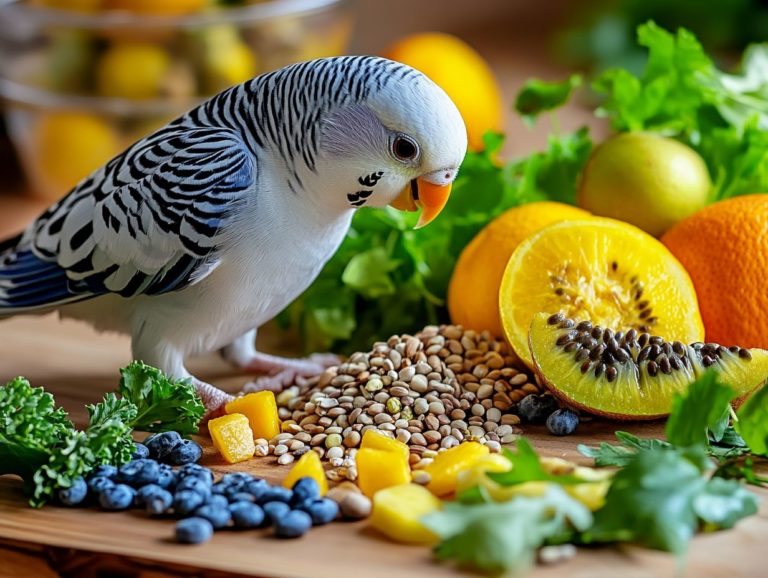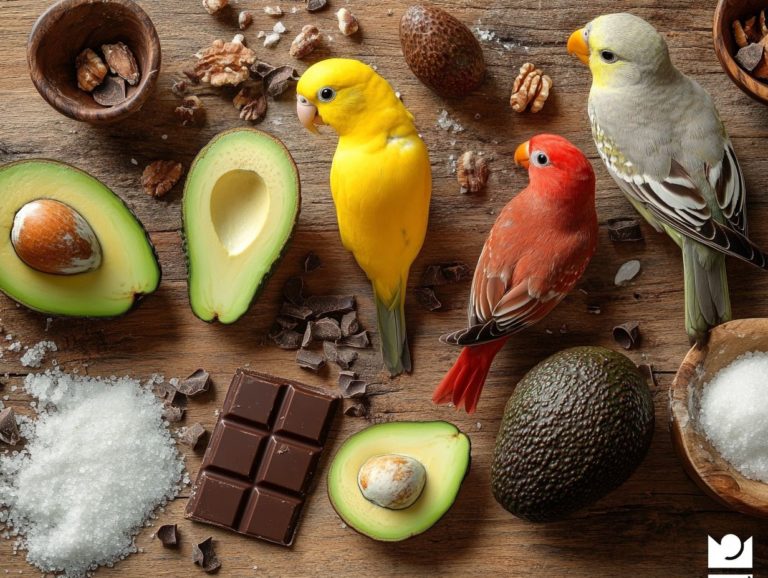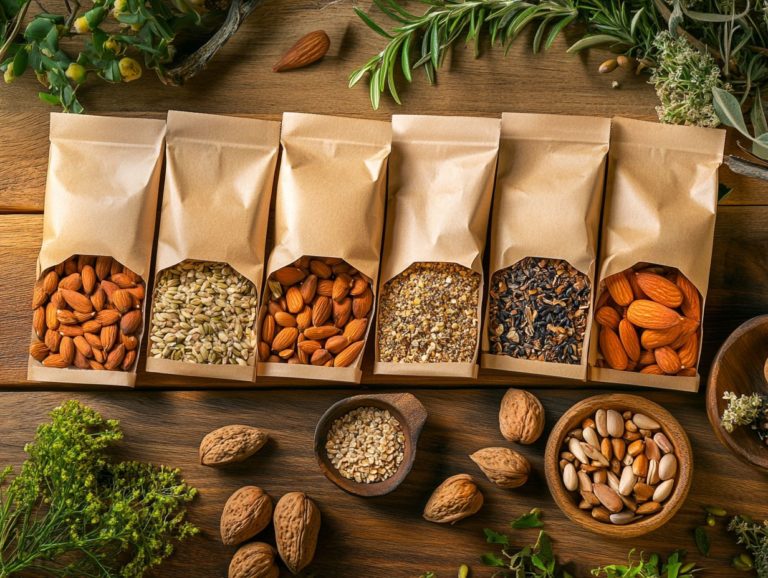The Nutritional Needs of Aging Birds
As your feathered friends age, their nutritional needs undergo significant changes. It is essential to understand how to best support their health and ensure the well-being of your pet birds.
This article delves into the unique challenges faced by aging birds, including how age influences their dietary requirements and the critical nutrients necessary for their well-being. We will focus primarily on proper nutrition and essential fatty acids.
You’ll discover common nutritional deficiencies, effective feeding strategies, and the importance of customized supplements tailored to different species. We will especially address calcium and vitamin A deficiencies.
Join us in helping your aging birds thrive!
Contents
- Key Takeaways:
- The Importance of Proper Nutrition for Aging Birds
- Key Nutrients for Aging Birds
- Common Nutritional Deficiencies in Aging Birds
- Feeding Strategies for Aging Birds
- Supplements for Aging Birds
- Types of Supplements and Recommended Dosages
- Special Considerations for Specific Species
- Adapting Nutrition for Different Types of Birds
- Frequently Asked Questions
- What are the nutritional needs of aging birds?
- What types of nutrients should be included in the diet of aging birds?
- Can aging birds eat the same food as younger birds?
- How much should I feed my aging bird?
- Are there any specific foods that are beneficial for aging birds?
- What should I do if my aging bird is not eating well?
Key Takeaways:
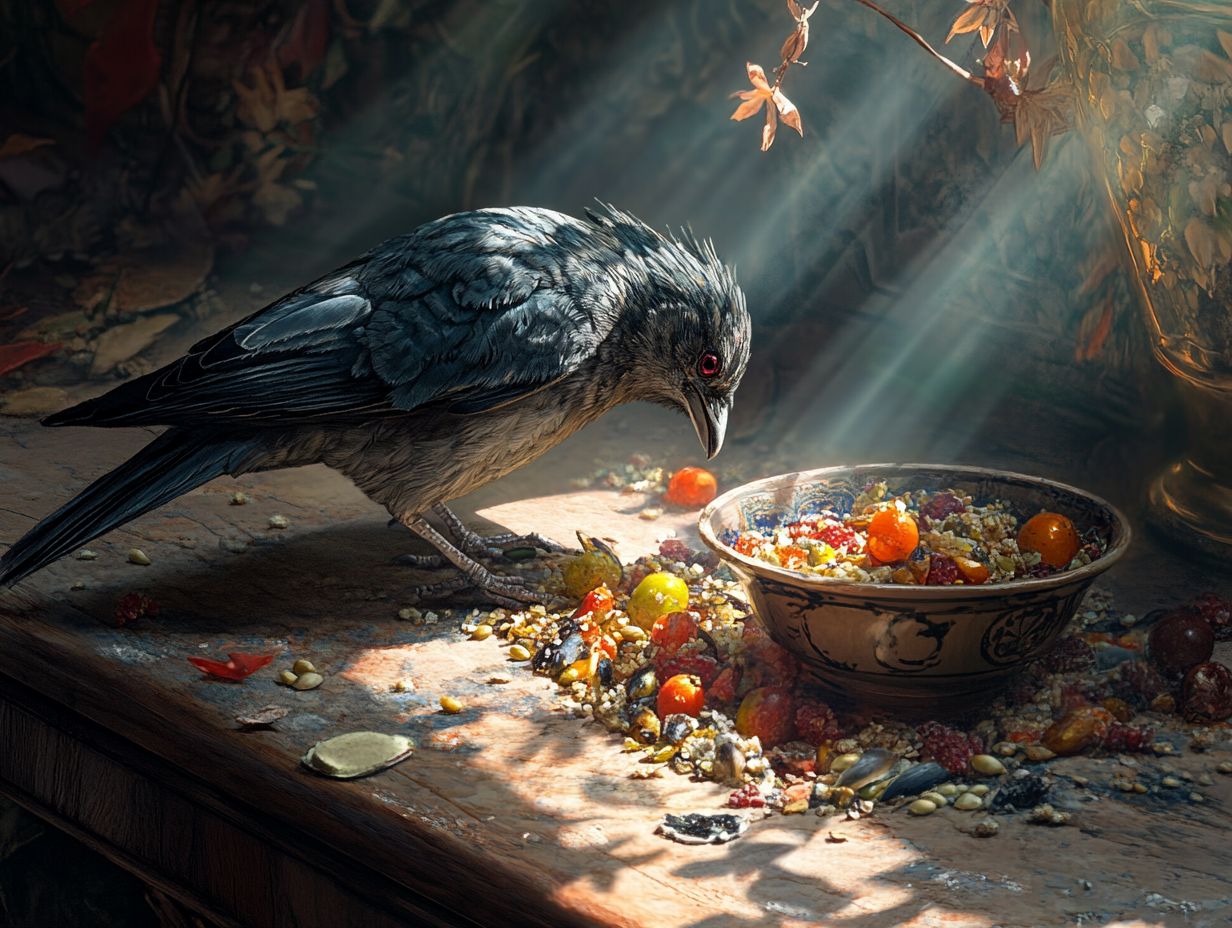
- Aging birds need special diets.
- Important nutrients include vitamins and minerals.
- Identify and correct common nutritional deficiencies.
The Importance of Proper Nutrition for Aging Birds
Proper nutrition is vital for aging pet birds. Their dietary needs evolve, directly impacting their overall health and longevity, while also preventing obesity and related health issues.
As your birds age, they might undergo changes in metabolism, nutrient absorption, and digestive processes. It is essential to provide a balanced diet that caters to their shifting needs and includes a variety of food groups.
Key nutrients like protein, calcium, and vitamin A are crucial for preventing health issues such as bone disease caused by poor nutrition, calcium deficiency, and obesity. Understanding these nutritional requirements is your first step toward ensuring a healthy and fulfilling life for your aging avian companions.
How Aging Affects Nutritional Needs
As your pet birds age, their nutritional needs undergo significant changes that can profoundly impact their health and well-being, making it crucial to understand vitamins and minerals essential for birds.
These shifts are primarily due to alterations in the efficiency of their digestive tract. In older birds, reduced saliva production and slower digestive motility may lead to less effective food breakdown and nutrient absorption.
As a result, they might face energy deficits and muscle wasting, along with risks of weight loss. It is crucial to recognize these changes to avoid neglecting proper nutrition, which can lead to specific health issues like obesity or feather plucking.
It s vital to adjust their dietary requirements, ensuring that your older birds receive the right balance of vitamins and minerals and adequate exposure to essential nutrients to support their energy needs and maintain optimal health.
Key Nutrients for Aging Birds
Understanding the essential nutrients needed for aging pet birds is crucial for preserving their health and vitality, while preventing vitamin deficiencies as they mature. By prioritizing their nutritional needs, you can ensure that your feathered companions thrive in their golden years.
Vitamins and Minerals
Vitamins and minerals are essential elements of a balanced diet for your aging pet birds. They play pivotal roles in their overall health.
As your feathered companions gracefully enter their golden years, the significance of specific nutrients, including dietary iron and water-soluble vitamins, becomes increasingly evident. Vitamin A, for example, is vital for maintaining healthy vision, skin, and immune function.
Meanwhile, calcium is essential for strong bones and proper muscle function, aiding in the prevention of conditions like osteoporosis. To provide a well-rounded diet, consider incorporating foods rich in these nutrients, such as dark leafy greens, carrots, and fortified pellet mixes.
By thoughtfully crafting a feeding plan that emphasizes these dietary sources, you can greatly enhance the wellbeing of your aging avian friends.
Protein and Amino Acids
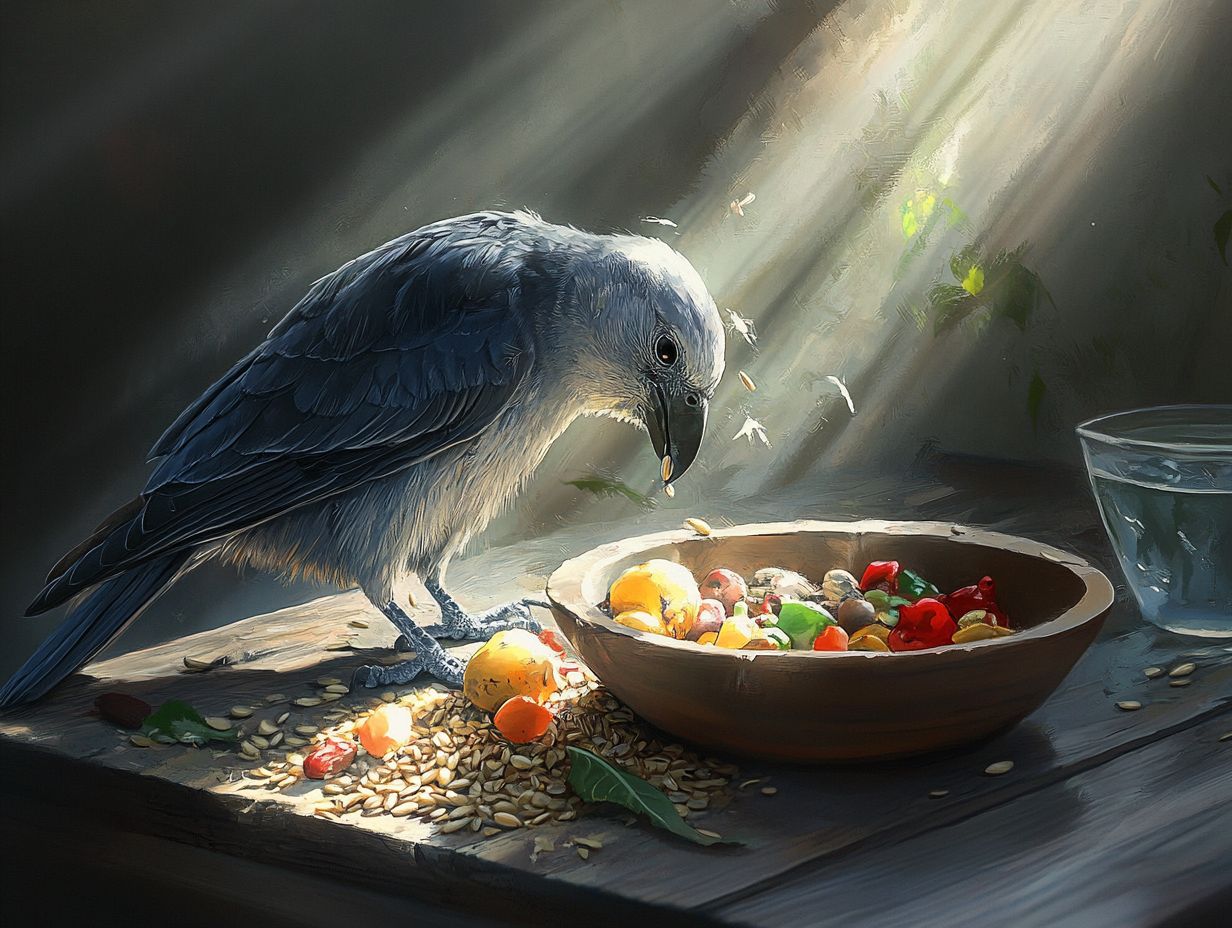
Protein and essential amino acids are crucial for your aging pet birds. They act as the primary energy source and are the building blocks for tissue repair and maintenance.
As birds age, their bodies change. Make sure they get high-quality protein to help with energy use. A protein-rich diet helps prevent weight loss a common concern for older birds and aids in maintaining muscle mass.
Foods like cooked legumes, quinoa, and lean poultry are excellent additions. These foods provide vital nutrients that boost energy and health.
Incorporating seeds and nuts into their diet offers not just protein but also essential fatty acids and healthy fats, contributing to a well-rounded nutritional profile.
Common Nutritional Deficiencies in Aging Birds
Aging pet birds often struggle with nutritional deficiencies, such as vitamin A deficiency and calcium deficiency. These issues can lead to serious health complications if not addressed quickly.
Be vigilant about their dietary needs to ensure their well-being as they age.
Identifying and Addressing Deficiencies
Identifying and addressing nutritional deficiencies is crucial for maintaining their health and vitality. Observe their behavior for shifts in activity levels, changes in feather appearance, and variations in vocalization. These signs provide insights into their nutritional needs.
Monitor health indicators like weight fluctuations and digestive issues to uncover any underlying deficiencies.
To tackle these challenges effectively, consider these practical strategies:
- Incorporate fortified foods rich in essential vitamins and minerals.
- Adjust portion sizes to meet their evolving needs.
- Introduce a diverse array of fresh fruits and vegetables to their diet.
Regular consultations with a veterinarian, like avian expert Dr. Laurie Hess, can help tailor supplementation effectively, ensuring your feathered companions thrive.
Feeding Strategies for Aging Birds
Implementing effective feeding strategies is crucial for meeting their dietary needs and ensuring they receive the proper nutrition. A thoughtful approach can greatly enhance their quality of life, helping them thrive.
Adjusting Diet for Age-Related Changes
As your birds age, adjust their diet to accommodate changes and maintain optimal health. This means thoughtfully selecting foods that enhance energy use and support healthy body functions.
Offer a diverse selection of fresh fruits, vegetables, and whole grains. These choices provide vital vitamins and elevate the overall enjoyment of their meals.
Incorporating various protein sources, like legumes or cooked eggs, ensures balanced meals that support their well-being. Mindful portion sizes and safe combinations introduce new flavors and enrich their feeding experience.
Supplements for Aging Birds
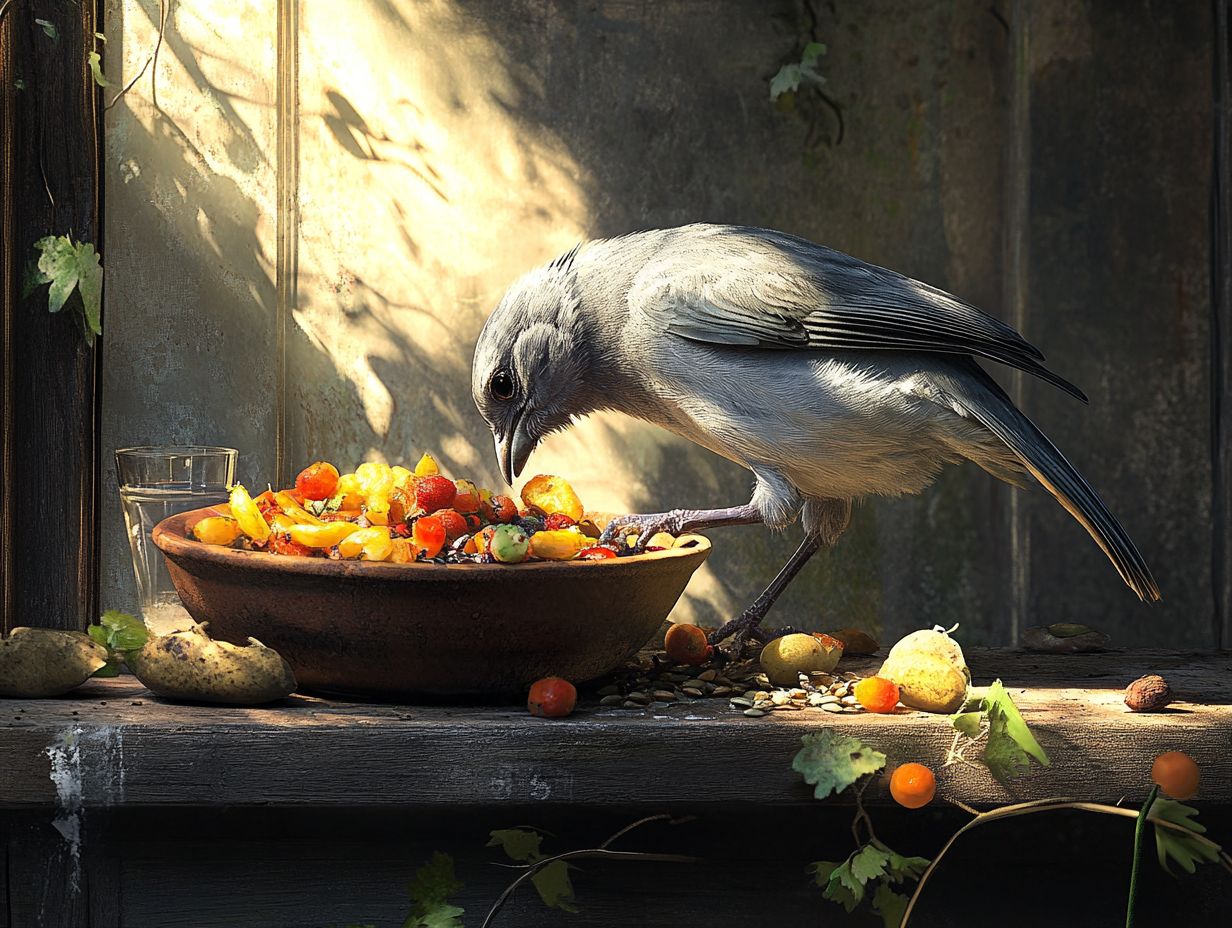
Dietary supplements significantly enhance the nutritional needs of aging pet birds. They ensure your birds receive essential vitamins and minerals crucial for their well-being. By incorporating these supplements, you can support their health and vitality during their golden years.
Types of Supplements and Recommended Dosages
Consider the array of supplements specifically crafted for aging pet birds. Each supplement caters to their distinct nutritional needs, including vitamin D and adding extra nutrients to their diet. Among these, calcium and multivitamins are essential additions that can significantly bolster your bird’s overall health and vitality.
Calcium plays a crucial role in maintaining strong bones and supporting egg production in female birds. Multivitamins offer a comprehensive array of nutrients that may be missing from an older bird’s diet, helping to prevent vitamin deficiencies. Always adhere to the dosage instructions found on product labels to ensure your feathered companion receives the appropriate amount tailored to its size and species.
You can easily incorporate these supplements into your bird’s routine by sprinkling powdered forms over their favorite foods or blending them into wet dishes. This method not only enhances the flavor but also promotes consistent consumption, making it easier for you to support your bird’s well-being.
Special Considerations for Specific Species
Different species of pet birds have distinct dietary needs, especially as they mature. It s crucial to address their nutritional requirements through proper feeding and understanding their digestive capabilities.
Adapting Nutrition for Different Types of Birds
Adapting nutrition for different types of pet birds is essential to meet their unique dietary needs as they age. Each species has its own distinct requirements, influenced by factors such as size, digestive capabilities, and natural habitat. Understanding these factors is crucial for effective bird care.
For example, parrots often thrive on a diet abundant in fruits, vegetables, and high-quality pellets. In contrast, finches may benefit from a carefully curated blend of seeds complemented by greens. Cockatiels require a mix of seeds, grains, and the occasional protein source, like cooked eggs.
Recognizing specific health concerns, such as obesity in budgerigars or vitamin A deficiency in canaries, is critical. By tailoring feeding practices to accommodate these varied needs, you can prevent nutritional deficiencies and promote the overall well-being of your feathered companions.
Frequently Asked Questions
What are the nutritional needs of aging birds?
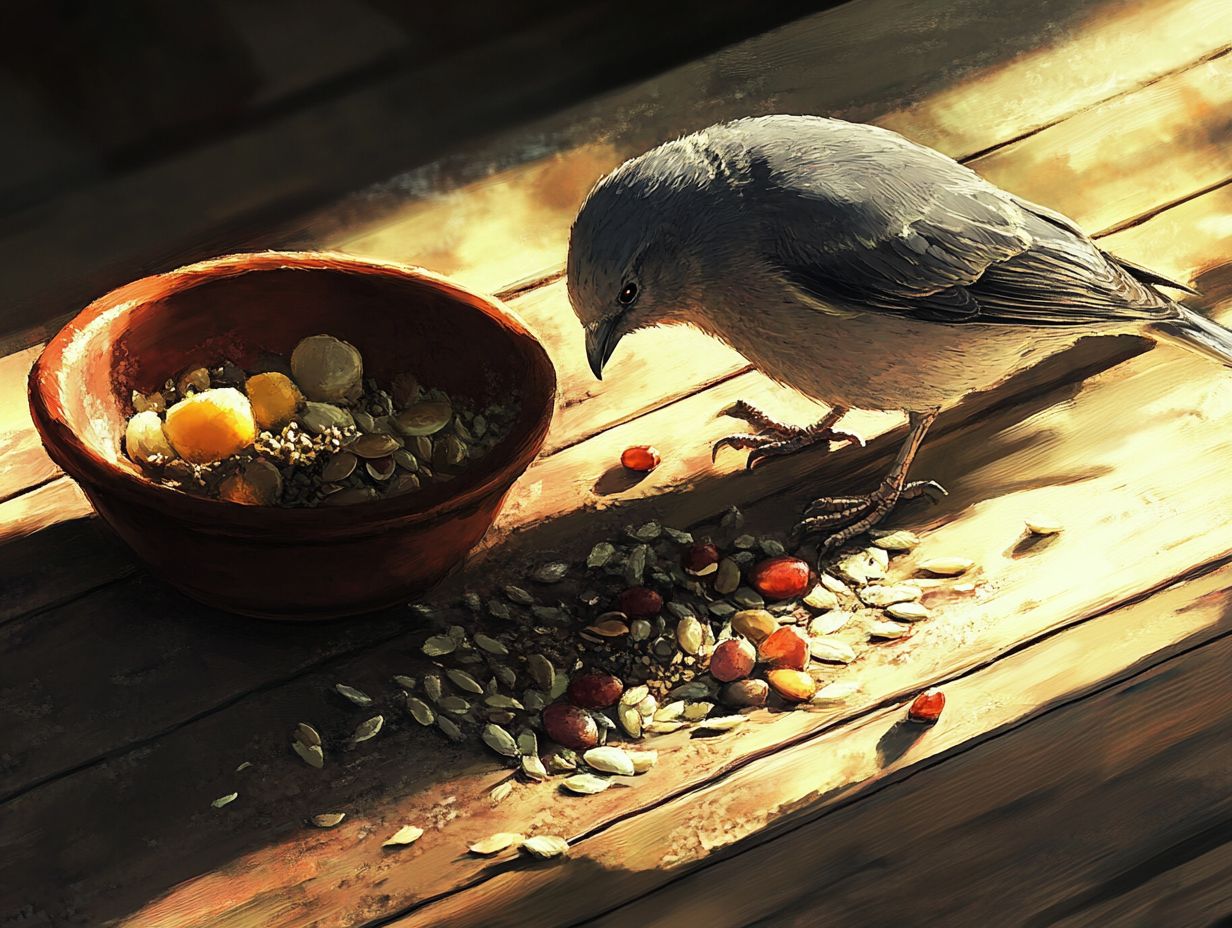
The nutritional needs of aging birds differ from younger birds due to changes in their metabolism and activity levels. To maintain their health, they require a diet that is lower in fat and higher in protein, as detailed in the understanding the nutritional needs of parrots.
What types of nutrients should be included in the diet of aging birds?
Aging birds need a balanced diet that includes essential vitamins, minerals, and amino acids. They also require a good source of calcium for strong bones and beaks.
Can aging birds eat the same food as younger birds?
No, aging birds have different dietary needs and should not eat the same food as younger birds. Their digestive systems are not as efficient, and they may have trouble digesting certain types of food.
How much should I feed my aging bird?
The amount of food an aging bird needs will depend on its size, species, and activity level. It’s important to monitor their weight and adjust their food intake accordingly to prevent obesity or malnutrition.
Are there any specific foods that are beneficial for aging birds?
Yes, certain foods are beneficial for aging birds, including dark leafy greens, fruits, and lean sources of protein such as cooked chicken or boiled eggs. These foods provide essential nutrients and can help maintain a healthy weight.
What should I do if my aging bird is not eating well?
If your aging bird is not eating well, it’s important to consult with a veterinarian. There may be underlying health issues that are causing a decrease in appetite. A vet can provide a specialized diet plan or recommend supplements to ensure your bird’s nutritional needs are being met.
Make your bird’s health a priority today! Consult with a veterinarian for personalized advice on your specific bird’s dietary needs.

